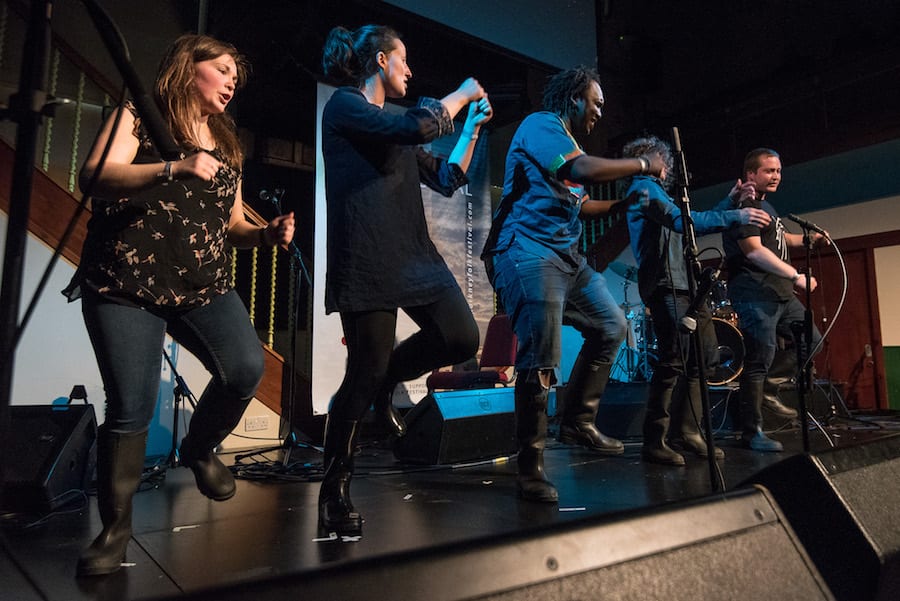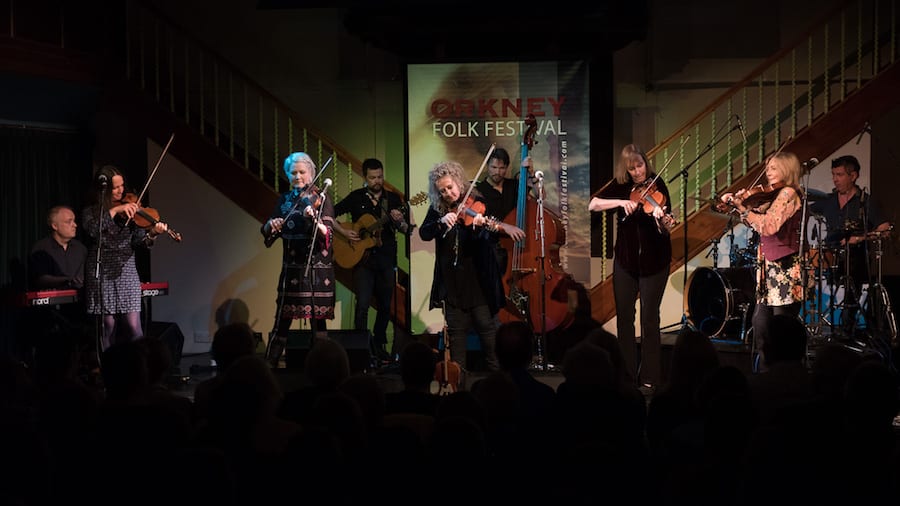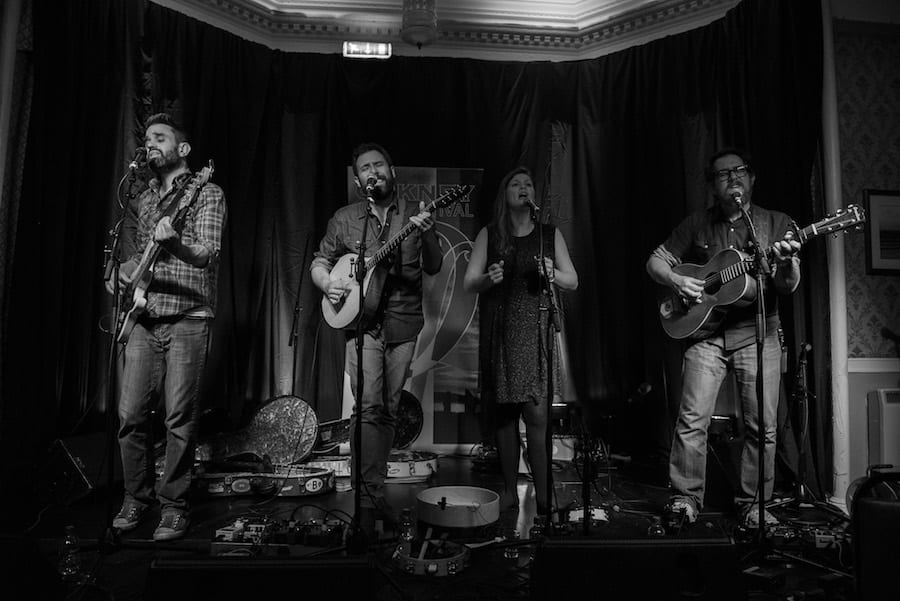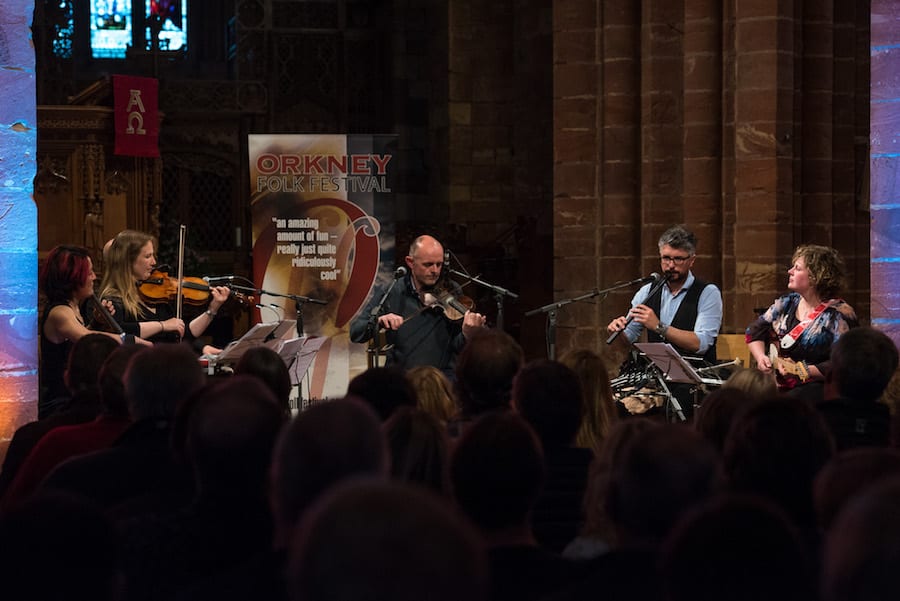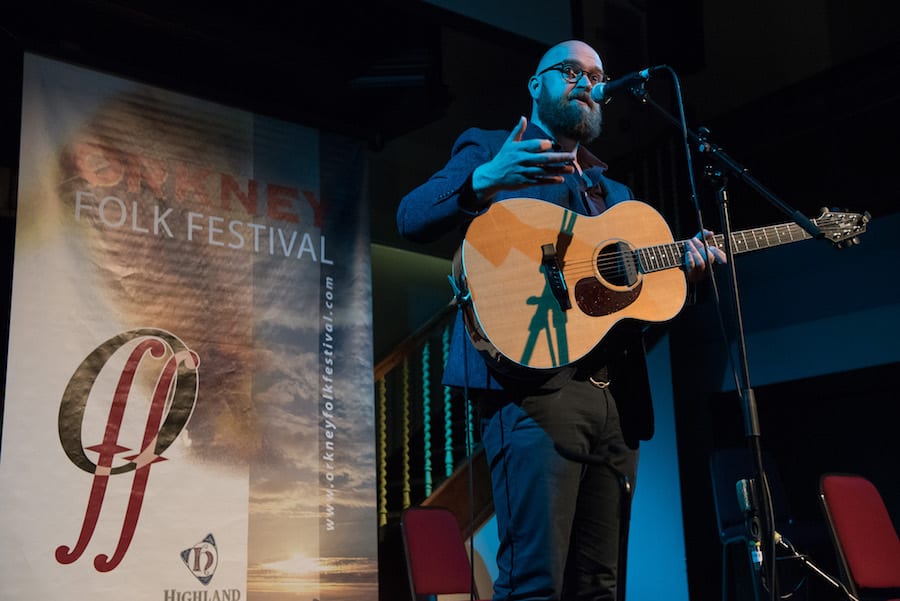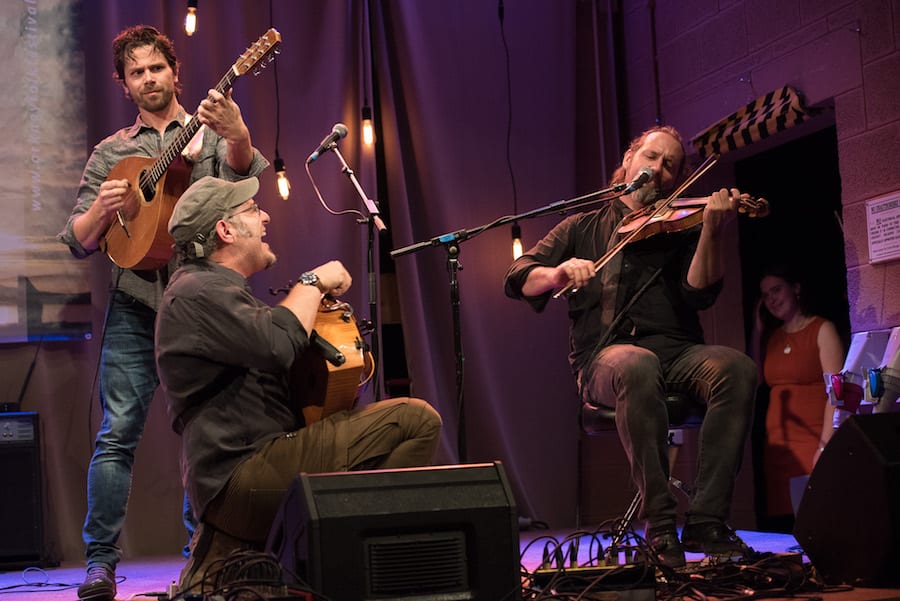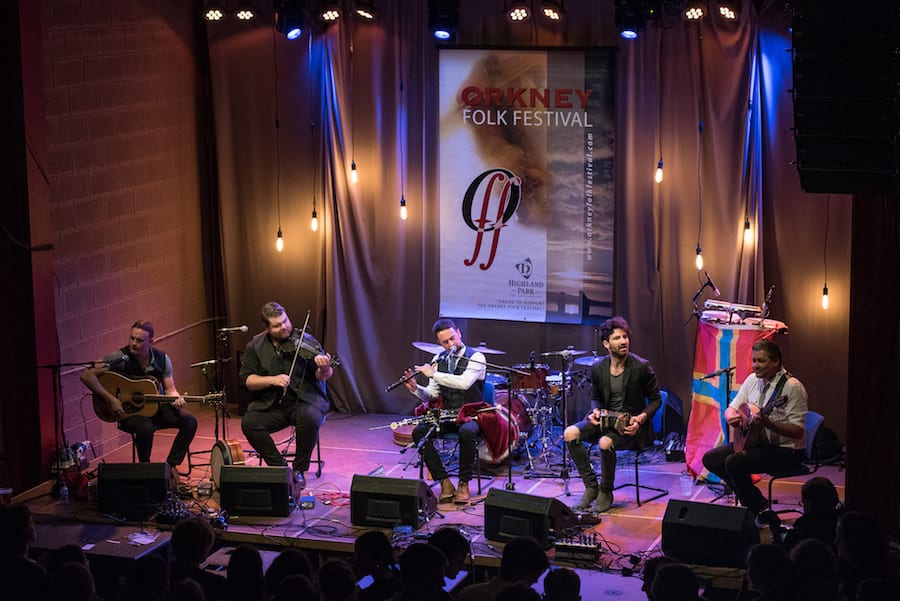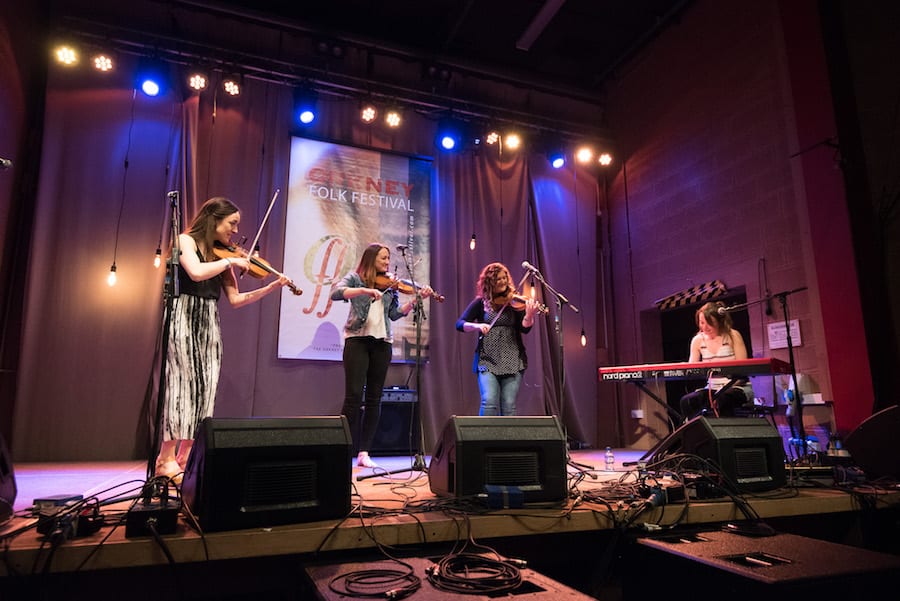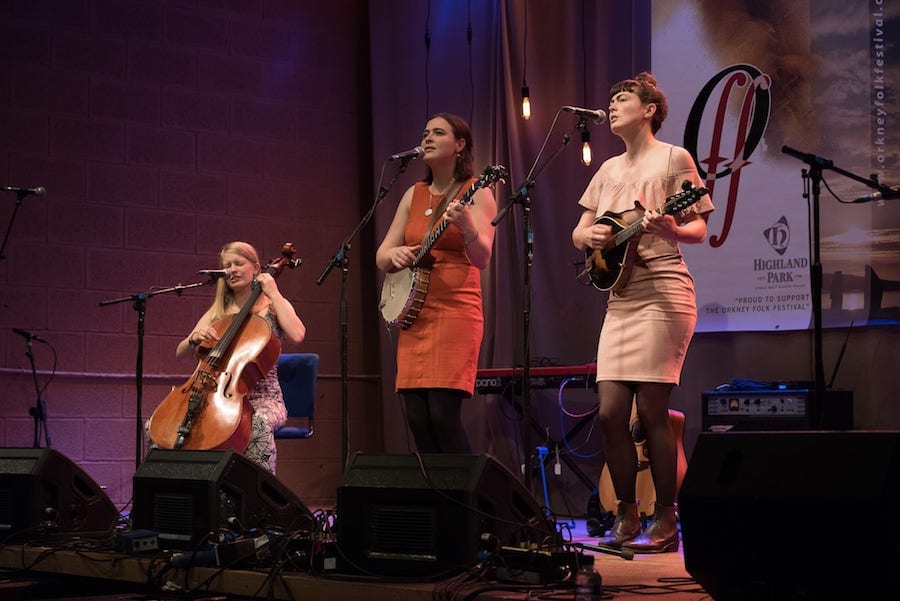Even from elsewhere in Scotland, it’s a long way to go for a spree – but then that’s just one of Orkney Folk Festival’s many unique charms. The sense of removal from everyday life that’s always heightened at island gatherings (at least for those of us who don’t live on them), is all the headier here. You can, of course, shorten the journey by flying (probably recommended for anyone setting off further south), but there’s something rewardingly time-honoured about fully experiencing the distance, a full day’s northward drive to the mainland’s end, its last stretch through the austere, otherworldly grandeur of Caithness and Sutherland, with Orkney mistily in view already, beyond the Pentland Firth.
By contrast, the 90-minute crossing on the MV Hamnavoe – the Old Norse name for our destination, Stromness, meaning ‘home port’ or ‘safe haven’ – positively flies by, especially given this year’s glorious weather. Passing close on the starboard side, the iconic The Old Man of Hoy sea-stack, towering 450 feet – nearly 140 meters – against rosy-red sandstone cliffs, heralds our arrival right into the thick of the action. For once you finally get to Stromness for the festival, you needn’t go very far at all.
Immediately opposite the harbour, the Stromness Hotel’s imposing Victorian edifice houses most of the visiting musicians, each night’s Festival Club, and a capacious main bar that becomes the weekend’s prime social hub, while just down the stone-flagged high street is Stromness Town Hall, a former church with amazing acoustics where many of the gigs take place. Also within easy stumbling-distance are the Royal Hotel and Ferry Inn, completing the triumvirate of hostelries hosting three daily sessions apiece, Friday through Sunday, nominally led by acts from the main concert programme, but ultimately informal, organic and open to all comers.
A significant proportion of festival visitors, and of the many Orcadians also thronging the town, buy few if any gig tickets, spending their weekend instead around this justly celebrated circuit, whether partaking as listeners or players. So sometimes a band will arrive for their afternoon slot, only to find lunchtime’s tunes still going strong, the bar so stowed they can’t even get near a seat.
With a pragmatism admirably typical of Northern Isles hedonism, too, all usual rules about on-street drinking (and a fair bit else. . .) seem suspended for the duration, leaving folk free to carry drinks pub-to-pub while doing their rounds. Bar staff reportedly rendezvous each morning after, to give each other back all their glasses.
The action into which you arrive straight off the ferry, in other words, is that of a Stromness unequivocally en fête – and then before you know it, you’re sat in the sold-out Town Hall, at one of Thursday’s six opening concerts around the islands, a five-act opening taster of music from home and abroad, the latter encompassing at least a dozen countries.
Fittingly, given the exceptional buoyancy of Orkney’s own music scene right now (think Kris Drever, The Chair and Fara, to name but the best-known few), the home team kicked things off, firstly with the festival’s customary rousing fanfare, by the Stromness Royal British Legion Pipe Band. They were followed by a 15-strong, multi-generational ensemble of instrumental learners from the Orkney Traditional Music Project, one of the key organisations involved in nurturing that robust cultural health, offering all-ages tuition centred on indigenous material, both traditional and modern.
Completing the first half were new Glasgow-based outfit Trip, individually hailing from Newcastle, Sligo, the Isle of Man and sundry Scottish airts[sic]; all current students on the Royal Conservatoire of Scotland’s world-renowned Traditional Music degree programme. Featuring accordion, fiddle, flute, piano and bodhran, their considered tune selection, technical confidence and ambitious, imaginative arrangements displayed arresting promise, particularly in a lovely slip jig/polka medley, pairing composers Hamish Napier and Liz Carroll (of whom more later), and an equally nifty conjunction of Leo McCann/Mohsen Amini reels.
The night’s – and probably the weekend’s – most cosmopolitan aural cocktail was served straight after the interval by Manchester’s Kabantu, whose English, Scottish, French and South African nationalities combine with classical, jazz and improvisational schooling, further catalysed by magpie-minded invention. With a line-up of fiddle, cello, guitar, double bass, percussion and vocals, their global stylistic compass embraced everything from the boldly souped-up Celtic/Portuguese opener to their bravura closing hoedown, ‘Black Mountain Rag’, via a seductively languorous Latin/lounge-jazz ballad, luxuriantly suffused with longing.
And so to the show’s pièce de resistance (even in such high-calibre company): the international fiddle supergroup String Sisters, currently riding high after February’s release of Between Wind and Water, their long-awaited second album. Originally convened by Shetlander Catriona Macdonald, and premièred at Celtic Connections in 2001, the all-female frontline reunited her with Ireland’s Mairéad Ní Mhaonaigh, of Altan fame; Irish-Americans Liz Carroll and Liz Knowles, and Sweden’s Emma Härdelin, masterfully backed by Scots/Norwegian ‘String Misters’ David Milligan (piano), Conrad Molleson (double bass), James Mackintosh (percussion) and Tore Bruvoll (guitar).
Further enhancing this sumptuous array of talents and kindred traditions, the intervening years’ cumulative experience and repertoire, for all five fiddlers, plus their effervescent delight at being back together, made for a gloriously exhilarating performance. Spanning gossamer-fine chamber-folk delicacy, deliciously spiky Nordic adventure and exultantly massed Celtic romps, it even included some singing, in Ní Mhaonaigh and Härdelin’s aptly breezy duet on ‘Wind and Rain’, all matching undiluted traditional spirit with utmost 21st-century sophistication.
After this palate-whetting tapas-style starter, Friday night’s Town Hall menu comprised richly extended sets from just two main acts, preceded by another tasty home-team hors d’oeuvre, this time showcasing young trad talent from the local high school, Stromness Academy.
The hall’s aforementioned amazing acoustic, a 300-capacity sweet spot framed by its lofty ecclesiastic dimensions, wood-lined interior and barrel-vaulted ceiling, consistently works its most transcendent magic for singers – and by extension their audiences. To put it bluntly, in a creative/artistic sense, seriously good singers seriously get off on this space, with its intoxicating, surround-sound resonance, and its audiences’ raptly pin-drop attention.
Which is where I came in on Newfoundland’s The Once, at Friday’s concert, just in time for Geraldine Hollett, Phil Churchill and Andrew Dale to slay everyone present with a riveting, heartrending a cappella ballad, ‘By the Glow of the Kerosene Light’, Wince Coles’s stoical elegy for bygone days and ways, deeply rooted in the band’s home turf and rigorously stripped to essentials.
Man, those harmonies. In that room. Like many in the crowd, I’d never seen The Once before, but they went straight into my Stromness Town Hall pantheon, joining the likes of Cara Dillon, Eddi Reader and Karan Casey – before they turned around and followed that with Queen’s ‘You’re My Best Friend’, charmingly reinvented as a gentle folksy/country ditty, this time with light but telling touches of banjo and guitar. It’s a version that last year saw them hit South Korea’s Top 100 – prompting Hollett here to observe, “The world is weird”. It is indeed, but most wonderfully so in this instance.
The band’s diverse original material potently dominated the set–list, spanning deceptively simple folk-songs – folk-songs at their timelessly eloquent best – and the enchanting acoustic pop of ‘Gonna Get Good’, likewise awash with uncanny vocal attunement. Sometimes they were four, with classy new bassist Craig Follett adding another gorgeous voice to the mix; sometimes guitarist Churchill went electric and they rocked things up with gusto, as in the brooding, sinewy ‘Before the Fall’, from new fourth album Time Enough, and the searing neo-vaudeville of ‘The Nameless Murderess’, where they all – but especially Hollett – let rip good and proper. Clearly revelling in a rapturous reception, they were palpably overjoyed to be there – in Orkney, in that venue – as were we, in every sense and dimension.
A scarily hard act to follow, one might think, but in a characteristically genius bit of programming, any such notions were oh-so gracefully sidestepped by Highland fiddle maestro Duncan Chisholm, flanked by the current incarnation of his ‘The Gathering’ line-up, handpicked from a pool of other elite Scottish players. On this occasion, this numbered fellow fiddler Patsy Reid, cellist Su-a Lee, Jarlath Henderson on uilleann pipes and whistles, Blazin’ Fiddles guitarist Anna Massie and Hamish Napier on keys.
After the ten-year, four-album Strathglass project, an extended musical communion with his family’s ancestral clan lands, Chisholm’s sixth studio album hymns his favourite faraway beach – fabled as the most beautiful in Britain – right up in the mainland’s top-left corner, just below Cape Wrath. And for any Chisholm fans who might have been fretting, after his last decade’s bounteous artistic fruition, that he’d struggle to match the Strathglass tunes’ breathtaking pinnacles – fear ye not: Sandwood is another absolute stunner, both recorded and live, displayed here to optimal advantage in that phenomenal sonic space.
As on the album, the sampled Sutherland accents of Donald ‘Dall’ MacKay opened the set, resonantly intoning,“Out here there is no time. Time is our imagination – past, present and future” – evoking not only the music’s eponymous locale, but many Orkney revellers’ general feelings – while the closing tune was a fresh addition to Chisholm’s signature repertoire of humdinger slow airs: ‘A Precious Place’. From start to finish, we were there; from wildly frolicking gale-tossed waves through sun-dappled breezes and cloud-play, to the kind of blissful, revelatory tranquillity in which the islands outside were basking.
For the heavens continued to beam on Orkney’s 36th folk festival, right through the long weekend – and that almost never happens this far north, so we were especially blessed indeed. The islands’ intensely pellucid sunlight set all their subtly sensuous beauties aglow, in endlessly mercurial panoramas of sea and sky, light and water, against lush green pasture, smoothly curving hills and splendidly craggy shorelines. This far north, too, by this time in May, the days are already way longer than in much of the UK at midsummer, dawning from around 3am, and only dwindling into gloaming after sunset at 10pm. Which makes those long festival nights very short, if you’re going by light-levels: don’t be surprised if you greet at least one sunrise – from the wrong end, as it were – upon making the trip.
In picking my gig of the festival, it was ultimately a toss-up between Friday’s Once/Chisholm/Town Hall triple whammy and Saturday night in Finstown, a few miles outside Stromness. It didn’t hurt that The Once were again on the bill, or that the local young quartet were Lyra, on fiddles, double bass and piano, all tutored by arguably the most crucial linchpin of Orkney’s traditional music scene, Douglas Montgomery, best known elsewhere as fiddler with The Chair. Tender years notwithstanding, the quartet’s fast-emerging style and substance were vibrantly in evidence, most of all perhaps in both their choice and execution of the late Angus Grant’s ‘Nordal Rumba’.
For me, though – given that I’d already been blown away by my new-found Newfoundland heroes – top honours in Finstown were shared by Scotland’s Findlay Napier and Quebec’s Le Vent du Nord. Napier’s epically muscular, grittily raw yet brilliantly nuanced voice, to both comic and emotive effect, allies with some of the most fabulous (literally and figuratively) original songs that anyone’s writing today, many co-composed with Boo Hewerdine.
Building on his sterling work with Back of the Moon and the Bar Room Mountaineers, Napier’s first two solo albums have both crafted themes around real-life inspirations, with last year’s second, Glasgow, drawn from the life and lore of his longtime adopted home city: fertile grist indeed, especially in such a master’s hands.
Alongside his own material, the Glasgow numbers here included Julia Doogan’s bittersweet title-track and The Blue Nile’s supernal classic ‘Walk Across the Rooftops’, while those originals conjured boyish dreams of romance in a late-night chippie, and rivalrous denizens of Sauchiehall Street’s Locarno Ballroom, circa 1928. Complementary gems from Glasgow’s predecessor VIP: Very Interesting Persons, included ‘The Man Who Sold New York’, an aptly wry yet swaggering portrayal of infamous conman George C. Parker, and the achingly dreamy ‘Valentina’, evoking the first female cosmonaut’s maiden voyage, partly from a former fellow prole’s perspective – still stuck in a Soviet factory – to shade in yet more poetic complexity.
There must be few souls alive who could resist Le Vent du Nord’s boundless joie de vivre – and all the fewer now they’re joined by fiddler and foot-percussionist André Brunet, formerly of La Bottine Souriante, bookending the quintet with co-instrumentalist Olivier Demers. And there was certainly no resistance in Finstown, as the band raised the roof with a jubilant maelstrom of prodigiously bouncy dance-tunes, also featuring hurdy-gurdy, accordion, bouzouki, piano, jaw-harp, guitar and electric bass, garlanded with lustily compelling five-part vocals, which, in one thrillingly throttled-back a cappella number, recalled the numinous, spine-tingling modalities of Gregorian chant.
With Brunet on board, their sound’s scale and intricacy are fast evolving into fresh dimensions, manifest in some sets’ looser, boldly freewheeling arrangements; in lashings of red-blooded honky-tonk brio, and in umpteen insouciant virtuoso flourishes, like one medley’s cheeky wee disco-funk intro, dashed off on fiddle, jaw-harp and fat bass licks.
These three shows barely scratch the surface of Orkney’s packed festival programme, this year totalling 14 main evening concerts, three more three-band bills at the Festival Club – more of a scheduled late-night gig than like-named happenings elsewhere – and three Song Club sessions, upstairs at the Royal, for those preferring their aftershows singaround-style. (Orkney pulls a dedicated hardcore of traditional song devotees, and the other sessions do tend rather towards the boisterous. . .)
Boisterous was most definitely the word for Friday’s Academy Club, another 10.30pm gig in the high-school theatre, transformed into an uproarious Orcadian/Québécois dancehall by Saltfishforty and Le Vent du Nord, and for and Saturday’s self-explanatory Stomp in the same venue, where Ímar and The Chair’s joint encore on‘Highway to Hell’ incited both crowd surfing and a 30-strong stage invasion.
Then there were another 11 daytime gigs – including Napier in his element at the Orkney Brewery in Quoyloo – a new outdoor stage on Saturday and Sunday afternoon, a big schools concert, more nightly sessions over in Kirkwall, Orkney’s capital, plus various hands-on workshops and a couple of illuminating talks. Sunday night’s two mammoth Farewell Concerts, each boasting ten or more acts, were ultimately followed by a mighty last sesh at the Stromness, before Monday’s dread appointment, for most of us, with the morning’s homeward ferry.
It’s some weekend altogether – the whole shebang run by a seasoned all-volunteer team, with superhuman smoothness and cheer.
All of which offered up plenty more musical highlights as we wove our merry way, among them above-mentioned instrumental firebrands Ímar, recent prize winners in the Radio 2 Folk Awards, at Friday’s Festival Club, revving up for those heavy-metal antics – ‘revving up’ for Ímar translating as ‘supersonically turbocharged’ for almost anyone else. Fiddle-based sorority Fara, further armed with beautiful singing, artful piano work and radiant ensemble rapport, were in extra-celebratory mood, simultaneously toasting four years since forming at this very festival, and the imminent inception of their much-anticipated sophomore album, whose first studio sessions were also booked for Monday.
Fellow young locals Gnoss revealed rich Rura-esque instrumental stylings, and likewise laudable influences in some striking song arrangements, including new EP title-track ‘Brother Wind’, by Tim O’Brien, and tragic traditional love-song ‘I Will Set My Ship In Order’, learned from Tony Cuffe.
Possibly stealing my entire festival show on Sunday afternoon, however, were Australia’s The Maes, formerly The Mae Trio, comprising Maggie and Elsie Rigby on vocals, banjo, guitar, mandolin and fiddle, plus new cellist Monique Clare. We were back at the Town Hall, with two sisters singing in sweet, sweet harmony, in a string of jewel-like self-penned songs and the odd discerning cover. One exquisitely affecting, autobiographical number, delineating a drawn-out relationship breakup with devastating tender economy, induced such fervently sustained applause – even by Orkney standards – as to bring its author near to tears, never mind us doing the clapping.
http://www.orkneyfolkfestival.com/
Photo Credits: Sean Purser


